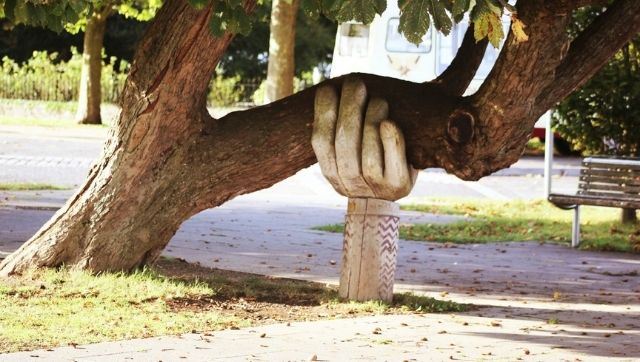Scripture
Sermon
We are a country divided.
However you voted this past Tuesday, and however you feel about the outcome of the election, there is no escaping that fact that we, as a nation, do not understand one another.
According to Pew Research Center polling, almost half of both Democrats and Republicans say that the other party’s policies are so misguided they pose a threat to the nation. Moreover, the same poll revealed that 55% of Democrats and 49% of Republicans say that the other party makes them ‘afraid.’1 We no longer trust one another; we no longer understand one another; we can no longer see from the perspective of those who sit across the political aisle from us.
Undoubtedly we were divided before the election began, but after a season of candidates highlighting and exploiting our differences, the divide now seems so vast that the thought of ever being able to embrace the politics of those with whom we disagree seems unthinkable.
~
A pulpit is a challenging place to stand the weekend after such an election, just as a church pew can be a difficult place to sit. I have no doubt that we are in mixed company—that we did not all vote for the same candidate and that we do not all share the same feelings about the outcome of the election. Moreover, I’m guessing that we are able to sit next to one another (and not split ourselves politically across the aisle) because we do not ask. We may suspect the politics of those around us, but we do not ask; and, if you are like me, you assume that the people around you share both your values and your views about how those values are best expressed in the political sphere.
The Pew Research Center’s polling makes clear that, for the majority of us, it is unfathomable that other people would vote for a different candidate. We literally cannot comprehend how people we know, people who live in the same world we do, who sit in the same pews with us on Sunday mornings, who hold values similar to our own, could possibly vote for the other candidate. And yet we know that they did. And as long as we’re not willing to talk about it, as long as we fear that person and the policies they endorse, we will never make progress.
~
Yet our focus, at least in this place and for this year, is ‘together.’ And so I want to begin with the assumption that however you voted this past week and whatever your feelings about the outcome, you voted out of your values and your convictions. And, I want to believe that our values, if not exactly the same, are common ones. Each of us, after all, shows up in this place each week to listen for God’s Word, to seek to follow Jesus, to give ourselves space from the overwhelming bombardment of cultural and popular marketing and messaging, to give ourselves at least a chance of listening for that still small voice of God that resides in each of us and speaks to what we know in our hearts to be true.
And so, without discounting our potentially vast political differences, but focusing instead on our common faith and our search for God, our search for that which is good and true, we must ask ourselves, as people of faith, how is it that we are to respond, together, to the cultural divide that has been revealed in this election and to the new political scene in which we find ourselves.
Fortunately for us, we are the heirs of a long tradition and we are not the first faith community to face such a situation. Indeed, our reading this morning from the prophecies of Isaiah was written to just such a community: a community bitterly divided between rival groups, many of whom were also despairing about the future and the possibility that things would, or indeed could, be different.
The community to which Isaiah was speaking was divided between those who had recently returned after being exiled to Babylon and those who had been allowed to remain in Judah throughout the exile. Two different communities that had experienced and survived the exile differently. Two separate communities that had different visions for what the future should look like and what the path forward should be. Two communities united by their faith, but divided by their experience of the recent past, struggling to find a path forward together.
And on top of that division was the inescapable fact that the end of exile had not resulted in a reversal of the Israelites’ fortunes. Despite Isaiah’s earlier prophecies—prophecies that every valley shall be lifted up and every mountain and hill made low, prophecies that those who wait for the Lord shall renew their strength, run and not be weary, walk and not be faint, prophecies that the glory of the Lord shall be revealed and all people shall see it together—despite these prophecies, the Israelites’ position within the larger political scene had not changed. They were still a small minority community surrounded by empires and armies far greater than their own. Nor had the end of the exile seen the immediate recreation of the Temple or the restoration of the Israelites financial security. Indeed, history tells us that this period was one of increasingly bleak social and economic conditions and severe hardships.
Isaiah’s earlier prophecies had helped reignite God’s word for a community of exiles who had, as instructed, built houses and worked for the welfare of the community to which they had been exiled. It had been sufficient to remind them that they were not Babylonians but Israelites. It had persuaded the majority of them that God would travel with them on the dangerous journey home and that they should, indeed, return home. And, insofar as the prophecies accomplished that much, they fulfilled their purpose.
But, for the majority of Israelites to whom today’s passage was addressed, the prophecies remained, as of yet, glaringly unfulfilled. And the reality of their situation was undeniably hopeless and bleak.
And so, the prophet, speaking to a despairing and divided community, begins to alternate between naming and affirming the Israelites’ bleak reality and holding before them an alternative vision. And it is the latter, the alternative vision, that we heard this morning: “I am about to create new heavens and a new earth,” says the Lord. “No more shall the sound of weeping be heard, nor the cry of distress. You shall build houses and inhabit them, plant vineyards and eat their fruit. You shall not labor in vain, nor bear children for calamity. The wolf and the lamb shall feed together. They shall not hurt or destroy on all my holy mountain,” says the Lord.
Despite its obviously unrealistic claims, this prophetic vision was not intended to be a Marxist opiate for the masses. It was not meant to describe a future so extravagant and ideal as to be impossible to attain. It was not meant to describe a time so far off that all the Israelites could do was sit back and pray for its eventuality.
Rather, Isaiah’s prophecy was an exercise of religious imagination that envisioned an alternate future as an act of defiance. It is an affirmation that ultimately it is God, not the powers and principalities of the world, who will determine what is to come. It is a reminder that, as people of faith, we are called to look beyond the reality surrounding us to the promises that God has made. We are to have faith in, which means we are to hope for and work for, the promises that God has made. We are to trust that God is greater than our political system and the politicians who inhabit it. We are to believe that good is stronger than evil, love stronger than hate, kindness stronger than apathy. And we are to act accordingly.
~
Believing in a future that our reality directly contradicts, and living as though God’s promises have already been realized, is rarely easy, and it may often put us in the minority, but here again we are in good company.
While this morning’s passage from Isaiah spoke to a divided and despairing community much like our own, our passage from Luke describes Jesus preparing his disciples for what will be the hard work of living into God’s promises despite the hostile reality they will find themselves faced with after his death.
Despite the doom and gloom of the situations he portrays, Jesus declares that they are an opportunity. These trials and tribulations, he says, will give you an opportunity to testify, a chance to bear witness.
In his book, Testimony: Talking Ourselves into Being Christian, preaching professor Thomas Long defines testifying as the act of putting our faith into words. He goes on to argue that the importance of testifying is not to convince others (though that’s one purpose to which testimony is put); rather, the act of testifying is important because it is part of how we discover exactly what it is that we believe: “when we talk about our faith, we are not merely expressing our beliefs,” Long argues, “we are coming more fully and clearly into belief. … Trying to put our faith into words is part of discovering what we know about God. … We talk our way toward believing more fully, more clearly, and more deeply.”
In this post-election season of division and disconnect, we do not need to testify to convince others that we are right and they are wrong. We need to put our faith into words to remind ourselves, and the world, that there is another vision for what the future could look like. In a country divided, a country where increasing numbers of people are beginning to fear for their safety and their livelihood because of the color of their skin, the God to whom they pray, or the gender of the people they love, the call to testify is a call to remind ourselves and others that this is not the vision that God has for the world. This is not the world in which we are called to participate. The call to testify is the call to place before ourselves and others and an alternative vision, a vision of a world in which nation does not rise against nation, in which none shall hurt or destroy, where lion and lamb shall live together.
~
We live in a divided nation. In a country in which we no longer seem capable, or inclined, to see things from the perspective of those who sit across the political aisle from us. A country in which increasing numbers of people are afraid because of who God created them to be or the name by which they call upon God. We live in a country that is in need of our Christian witness and testimony, a country that needs an alternative vision held up before it so that it might work toward something more peaceful, more cohesive, and more unifying than the rhetoric we have heard this past election season. We live in a country that needs not only the testimony of our lips, the visions we can paint with our words, but the testimony of our lives, the visions and truths we proclaim with our time, our talents, and our treasures.
The question before us, as people of faith, this post-election season is: to what will your life and words testify? Will you entrench yourself in your political position, either glorying in your victory or despairing in your loss? Or will you look beyond the reality presented by the media and popular culture to the future that God has promised? Will you continue to speak at the people who stand on the other side of the aisle? Or will you move to stand beside them, trusting that love is more powerful than hate, that kindness is stronger than animosity? Will you live into the divisive rhetoric that keeps us apart? Or will you trust that we are all created by God and have within us the capacity to do what is right and good?
The Lord has told us what is good. And what does the Lord require of us? To do justice, to love kindness, and to walk humbly with God (Micah 6:8). As people of faith, we trust that, regardless of who is in office, God is at work in the world. Our job is to not suffer from a failure of imagination. For surely what lies before us now is an opportunity.
Amen.




